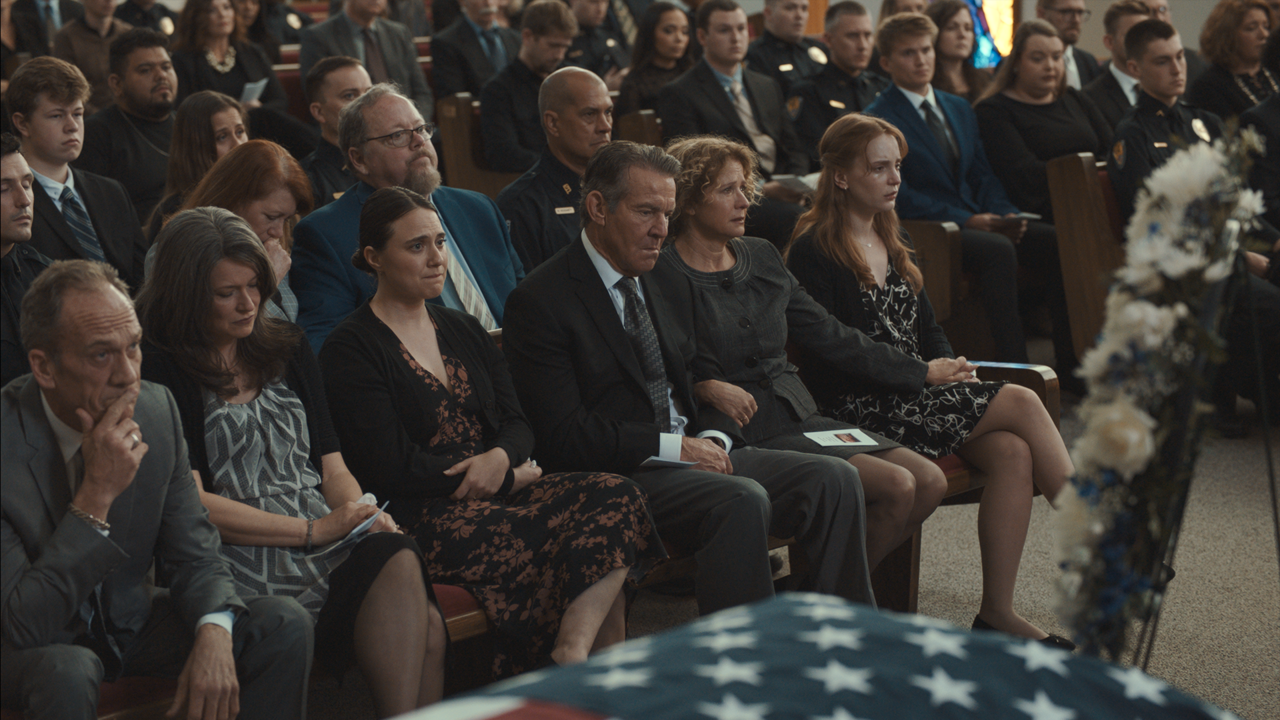Sovereign: Ron Swanson Would Be Horrified at Offerman as Jerry Kane
AND ANOTHER ONE! I caught Sovereign at the Tribeca Film Festival and lets just say, I was not ready for something so real.
Before the January 6 Capitol terrorist attack,before the Proud Boys, QAnon followers, and Oath Keepers, there were Sovereign Citizens. Born from circles of white supremacy and the ideological groundwork of William Potter Gale primarily in the 1970s, sovereign individuals claim to be exempt from government laws unless they consent to them. This subgroup ignited during economic hardship and governmental distrust, rejecting driver’s licenses, vehicle registrations, taxes, and any authority of U.S. courts. In this chilling portrayal of Jerry Kane, Nick Offerman’s haunting performance will reignite audiences’ frustrations with the enduring presence of anti-government extremism in American life.
Nick Offerman and Jacob Tremplay in Sovereign
Sovereign is based on real events and follows Jerry Kane (Offerman), an unemployed roofer, as he travels the country with his teenage son Joe (Jacob Tremblay) to give desperate people seminars on pseudo-legal alternatives to get out of their debt. Jerry is on a mission to stay one step ahead of what he sees as a corrupt system while spreading his anti-government ideas, which he believes are true. His home is the only one in his neighborhood that’s neglected, and Joe is homeschooled, spending most of his days alone with his dog and his workbooks. Joe values his father’s intelligence and wants to make him proud, but he also wants a normal life. He wants friends, to go to school, to talk to the girl next door, and a world where he doesn’t have to be afraid of the law. Joe begins to question his father’s mental stability when Jerry becomes more abrasive and their encounters with the police become more intense. He starts to see the flaws in Jerry’s way of thinking, yet he still feels compelled to stand by him when no one else will.
Christian Swegal makes a powerful feature film debut with this action/crime thriller that is timelier than ever! Every word feels like it was carefully selected and shows the characters’ contradictions through both silence and action. Swegal doesn’t use spectacle to keep the audience engaged, and as the story unfolds, trust erodes and the emotional weight of Jerry’s actions grows heavier.
Offerman is mostly known for making us laugh, especially as Ron Swanson on Parks and Recreation, a character that’s unbeatably one of the most iconic personalities in TV history. Swanson’s dry delivery and playful brand of libertarianism made him heavily quotable and oddly lovable. That’s why seeing Offerman take on a serious role like Jerry Kane feels so jarring, in the best way possible. Jerry has no charm, humor, warmth, and watching Offerman bring that to life will have you in awe. You can tell Jerry loves his son, but it’s the kind of love that’s been deprived of any real connection because of Jerry’s obsessions. This film is undeniably one of 2025’s most uncomfortable films to watch, and that’s exactly why it works. This might not be Offerman’s magnum opus, but if it ends up being the role he is remembered for, it will be more than earned.
Watching Jerry spiral isn’t just unsettling; it’s exhausting. He defies law enforcement and the courts, and in the process puts his son’s life in irreversible danger. Jerry's constant agitation, inability to empathize with anyone he doesn't lecture, and his growing paranoia make each scene more and more uncomfortable. When he talks to his son, his girlfriend, or anyone else, you can almost feel how hesitant they are to say anything that he might disagree with. If you have a fidget spinner, throw it in the bag, trust me because this film is determined to stress you out. The movie puts you in his head, which makes the audience feel suffocated by his choices.
By comparison, it’s like the first time you watched Robert DeNiro in Taxi Driver or Joaquin Phoenix in Joker, where the audience has to sit with a character who thinks he's doing the right thing even as he drifts away from reality. Where is the pause button in the movie theater when you need it? Tremblay gives a very moving performance as Joe, a boy who wants to believe in his father but is becoming hyper-aware of the harm being done. With minimal dialogue, we see that Joe’s environment and circumstances dictate his future, while he battles admiration, fear, indoctrination, love, and the need to escape.
Swegal does a compelling job of weaving this narrative together, using John Bouchart, the town’s former police chief (played by Dennis Quaid), as a counterpoint to Jerry Kane. His relationship with his own son Adam (Thomas Mann) is perhaps not affectionate but strained for unrelated reasons. Bouchart wants Adam to be tough, rigid, and embody the attributes he associates with an ideal cop and a father of good reputation. By blending the two father–son relations, the film focuses on how varied notions of control and belief shape an individual’s life. This intermingling works to ground the story as Jerry’s world moves into sinister places.
As the story plays out, Dustin Lane’s cinematography jumps out at you because it complements the script so well. His bleak color palette and close framing reflect the dark energy of Jerry’s life. The camera’s focus on tight, claustrophobic spaces like their van doubles down on the erosion of freedoms that Jerry and Joe face despite their talk about autonomy. The symbiotic relationship between Swegal’s script and Lane’s visuals advances the story to another level.While the film doesn’t map out the full sovereign citizen movement, it elegantly captures the manner in which the ideas become a lifeline among the rejected. Jerry’s seminars attract the jobless, the homeless, the uninsured, and their all-around discontent with United States institutions. The film does not excuse the choices of the audience members, but uncovers unmistakably the manner in which desperation takes even the most convoluted rationalization and makes it seem like salvation.
It is an uncomfortable film, but one we must see at least once.
Sovereign is a sobering picture of anti-governmental values, radicalization, fatherhood, and the destructive effects of American extremism. It offers no silver lining but is a stark reminder of how fear and ideology can warp love and freedom into something dangerous. What Christian Swegal and Nick Offerman created remains eye-opening, especially for anyone who has avoided the crimes in the Bible Belt. If you’d like some background as to what this film is about, look up the 2010 Memphis shooting.
watch the trailer
NOVEMBER|ELEVENTH RATING
3.5 STARS





